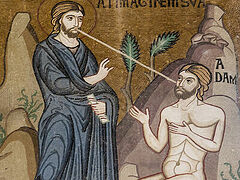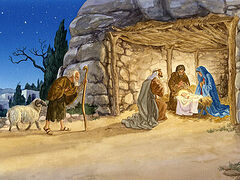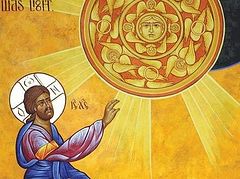 Hidden well away in the Greek of the genealogy with which St. Matthew opens his Gospel is a little theological secret—a secret which utterly vanishes in most English translations. Matthew begins his genealogy of Jesus by saying that “Abraham begot Isaac, and Isaac begot Jacob, and Jacob begot Judah and his brothers” and so on and on for about another forty names. The word here rendered “begot” is the Greek ἐγέννησεν/ egennesen, the active mood of the verb γεννάω/ gennao. After so many instances of one man actively begetting someone else, the reader is primed for the concluding climax “and Joseph begot Jesus”. But that is not how the genealogy concludes.
Hidden well away in the Greek of the genealogy with which St. Matthew opens his Gospel is a little theological secret—a secret which utterly vanishes in most English translations. Matthew begins his genealogy of Jesus by saying that “Abraham begot Isaac, and Isaac begot Jacob, and Jacob begot Judah and his brothers” and so on and on for about another forty names. The word here rendered “begot” is the Greek ἐγέννησεν/ egennesen, the active mood of the verb γεννάω/ gennao. After so many instances of one man actively begetting someone else, the reader is primed for the concluding climax “and Joseph begot Jesus”. But that is not how the genealogy concludes.
Rather, it concludes “Jacob begot Joseph the husband of Mary from whom was begotten Jesus”—in Greek not ἐγέννησεν, but ἐγεννήθη/ egennethe, not the active of gennao, but the passive. Reading along in the Greek sets one up to expect yet another active verb, and the presence of the passive offers the reader a kind of psychological and grammatical jolt. The presence of the passive after so many generations of active is unexpected—much as the virgin birth of the Messiah was unexpected.
For the Jews of Second Temple Judaism did not expect their Messiah to be born of a virgin. The Christological insight that St. Matthew had about the Messianic significance of Isaiah 7:14 was given to him by God (doubtless aided by the fact that Jesus was in fact born from a virgin), and the notion of the Messiah’s virgin birth came as something of an unexpected surprise.
The point is this: our God is a God of the unexpected. That is what the Hebrew Scriptures mean when they describe Him as “the living God”—that is, He is a God who freely acts, who chooses what He will do in the earth and how He will respond to us. He is not the God of the Deists who having made the world sits back and simply watches how things will unfold. The living God works in our midst in the realm of history. In the words of the Psalmist, “He does whatever He pleases in heaven or on earth” (Psalm 115:3). And a lot of what He does is unexpected.
We see this abundantly demonstrated in the ministry and life of Christ. Israel expected their Messiah to be a patriot, a hero, a man who would raise His voice and rally the troops and form an army and chase the Romans out of Palestine, spilling as much Roman blood as possible. They expected Him to slay the sinners and banish war and crime and evil from the world. They did not expect that the Kingdom He brought would be one in which good and evil co-existed until the end of the age (see Matthew 13:24-30). They did not expect Him to forego bombastic patriotic speeches and refuse to raise His voice in the street (see Matthew 12:15-21). They expected Him to wage victorious war against the Romans and kill them (preferably in great numbers), not be killed by them on a cross of shame and defeat. And they certainly did not expect Him to completely reconfigure Israel as a Church, transcending its national and racial identity so that Gentiles could become a part of God’s people, making baptism and Eucharist the signs of belonging to Israel rather than circumcision and Sabbath. All of these things that Christ did were scandalous and completely unexpected.
So unexpected, in fact, that many Jews were unprepared and unwilling to accept Him. They expected Messiah to fulfill their desires and hopes and nationalistic dreams, not to do something else so dramatically different. When Christ did the unexpected, they concluded that He could not be the Messiah and they rejected Him. Some Jews of course accepted Him (such as the apostles) and allowed Him to reconfigure their views accordingly. Though what He did was unexpected, they still went along with Him. And what, we may ask, was the difference between those who refused to accept the unexpected and those who accepted it? Humility.
Some Jews listening to Jesus were proud of heart and allowed their pride to harden their hearts and blind them to the glory of Christ. Other Jews were humble of heart and accepted what Christ taught even though it meant completely rethinking all that they had been expecting. In this way the unexpectedness of Christ’s ministry acted as a way of sifting the proud from the humble. It is as Simeon the Righteous prophesied to the Mother of God when he first saw the Christ Child: “Behold, this child is appointed for the fall and rise of many in Israel” (Luke 2:34). Malachi of old proclaimed that Messiah would sit as a smelter (Malachi 3:3) and this smelting was accomplished through our Lord’s unexpected ministry, which separated the proud from the humble.
What does all this mean for us today? Simply that the God with whom we have to do is a God of the unexpected. He may answer our prayers as we hope and expect—or He may not. He may choose do something which we did not and could never foresee, but Paul has taught us that whatever He does works together with all things for our good (Romans 8:28). What is required of us is humility, the humility to accept all that comes from God’s hand without rebelling against it.
We often live in the sad and tragic delusion that we are in control. In fact, we are never really in control, but always live under the mercy of God. We cannot control what goes on around us or (most of the time) even control ourselves. The path of wisdom bids us give up this moronic delusion and give thanks to God for whatever His mercy brings our way. He remains the sovereign Lord, the One who does whatever He pleases, the God of the unexpected. Under His hand we can find our peace.




